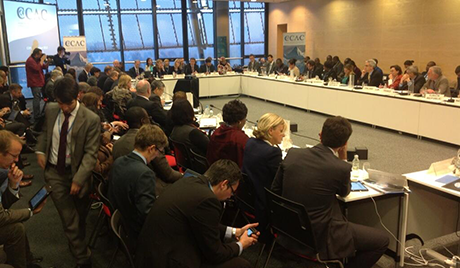
In the climate negotiations under the United Nations framework, we are used to seeing geographical blocs and other blocs at loggerheads. The tension draws attention, but it isn’t the only story of blocs at the climate conference.
In Warsaw Thursday, members of the Climate and Clean Air Coalition – 75 countries and international organizations working together – met and talked about their progress so far and work for the future to slow climate change.
What do these countries – among them, Nigeria, Sweden, the United States, Ghana, Mexico, the United Kingdom, Chile, Morocco, and Canada – have in common?
Answer: The firm belief that we can work together and substantially reduce black carbon, methane, and other short-lived climate pollutants.
These pollutants come from driving diesel trucks and burning wood, from landfills, oil and gas operations, old refrigeration and air-conditioning systems, aerosols, and other sources. All can be acted on fast.
By working together to cut their emissions, we can:
- Improve human health and the livability of cities and increase agricultural productivity to feed more people.
- Achieve a slowing of climate change while we act to reduce CO2 emissions.
- Build confidence as the global negotiations struggle to maintain momentum.
The coalition, still in its infancy, is working on a pay-for performance methane reduction facility and a green freight initiative. It is working on stopping burning in agriculture and forestry and reducing methane leakage in the oil and gas sector and global gas flaring.
The CCAC is proof that collective action can produce short-term, tangible results. These countries, science organizations, financiers, NGOs and development organizations are rolling up their sleeves to make it happen.
Rachel Kyte
Vice President for Sustainable Development
www.worldbank.org/sustainabledevelopment
Twitter: @rkyte365
Photo Courtesy of Climate and Clean Air Coalition


Join the Conversation